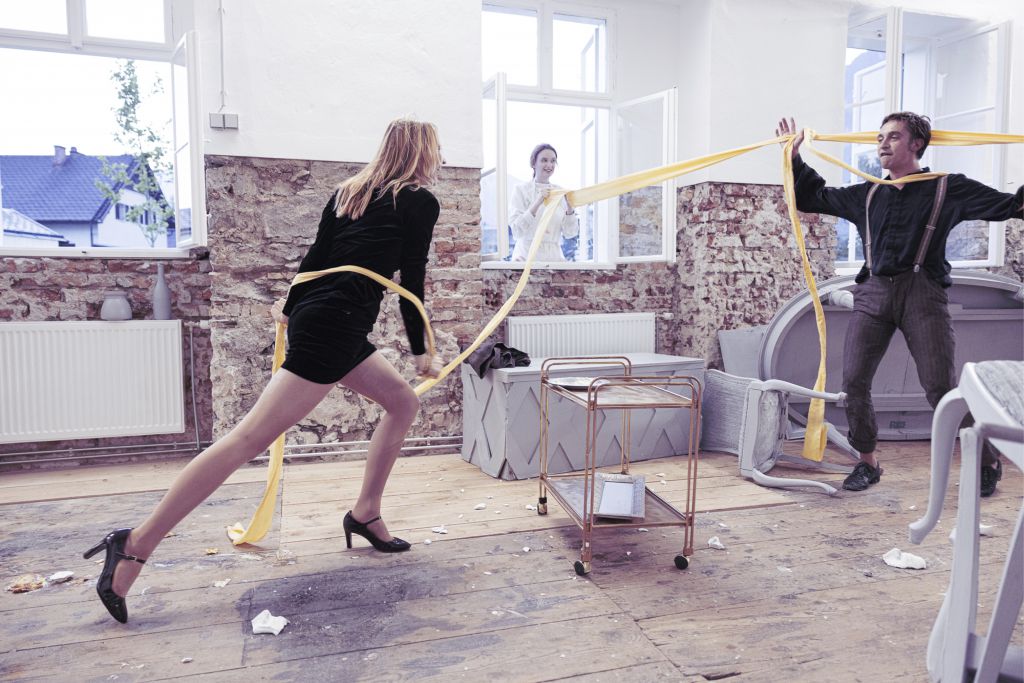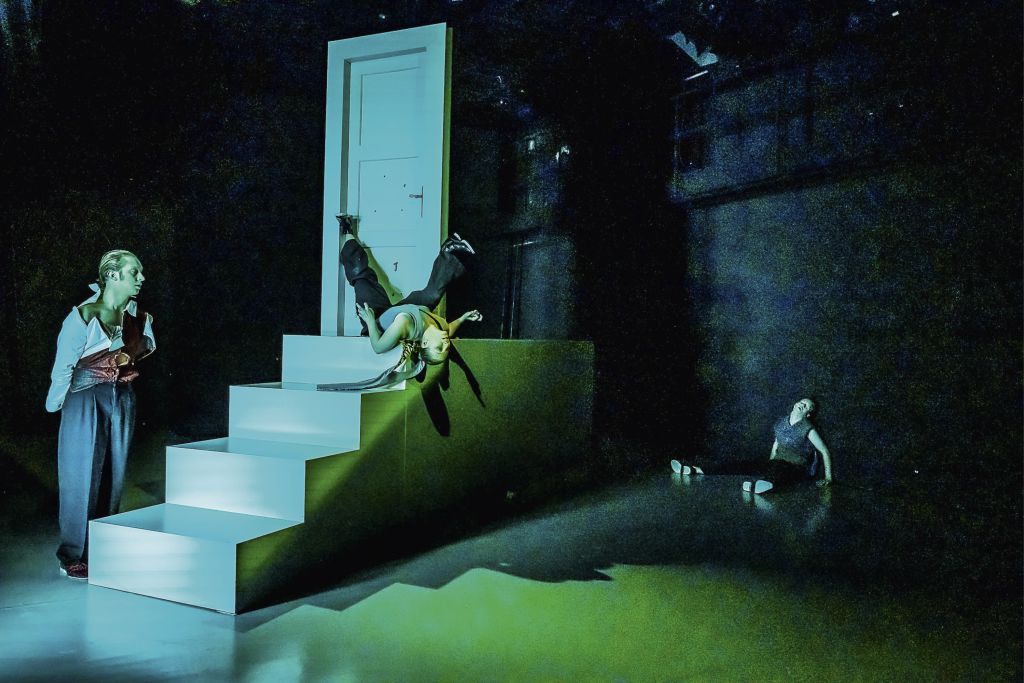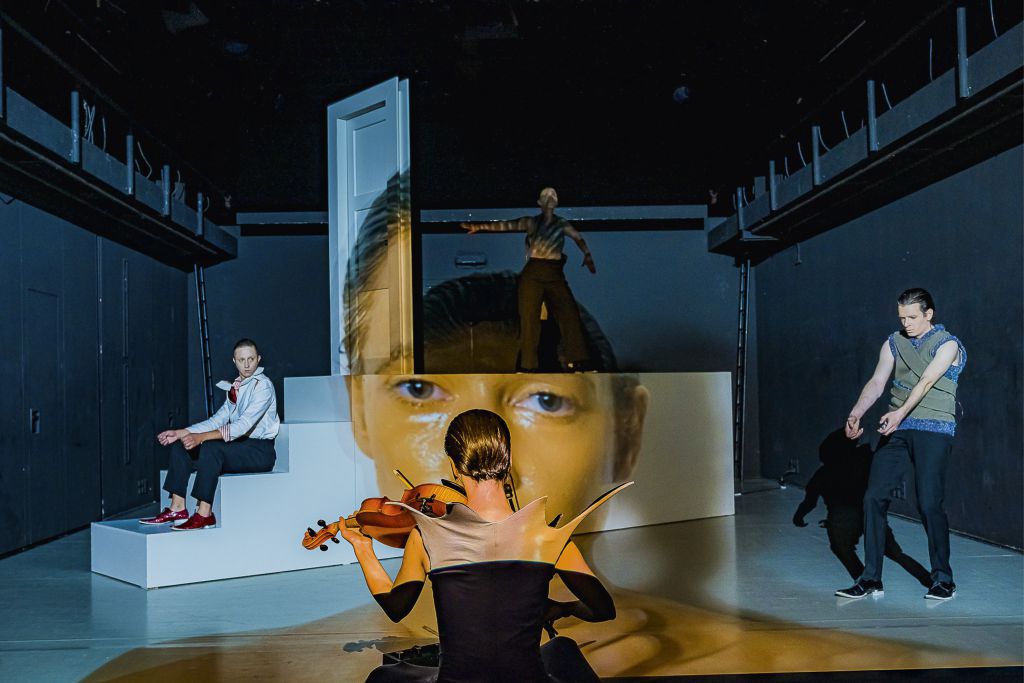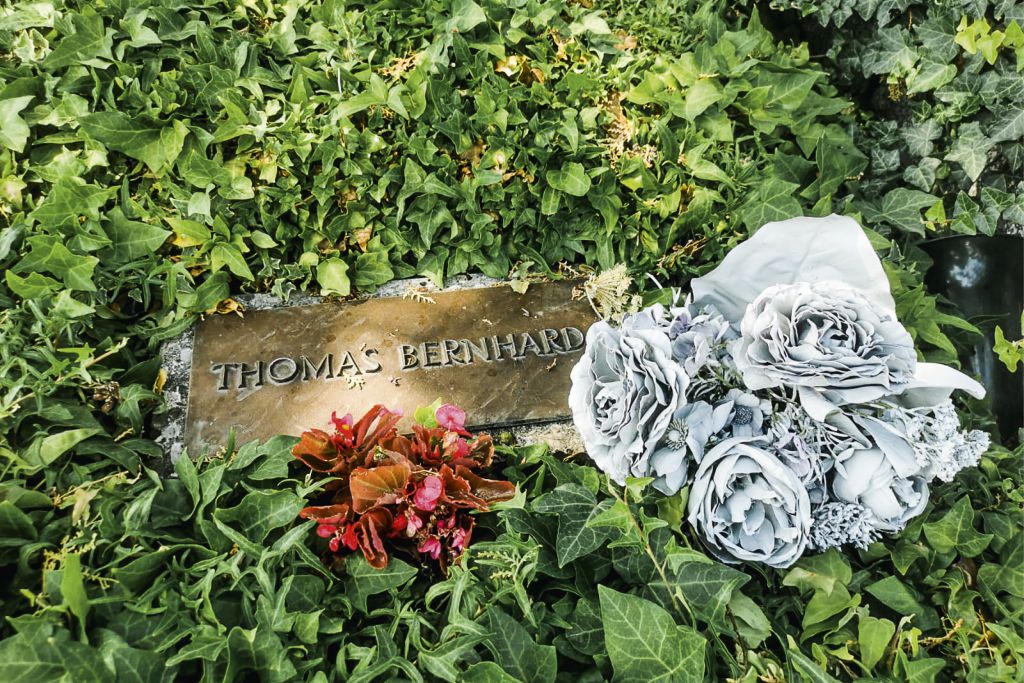Two pre-diploma productions at the Max Reinhardt Seminar place a firm focus on two of Austria’s great wordsmiths: Thomas Bernhard und Gert Jonke
During the past academic year, two productions at the Max Reinhardt Seminar—both of which had to be premièred without a live audience—were devoted to works by Thomas Bernhard and Gert Jonke, respectively. It was with these two masterful Austrian playwrights that directing students Azelia Opak and Fritzi Wartenberg set out to explore the limits of reality in their pre-diploma productions, using the various lockdown phases for intense study of the language and the material.

The fact that the première of Azelia Opak’s production, entitled Ritter, Dene, Voss – Winderlich, Rose, Tuppy, had to be postponed several times and ultimately still took place without an audience at Schlosstheater Schönbrunn is something that Opak takes with humour. “It’s baked into the DNA of Thomas Bernhard’s plays that they go through difficult births”—and it’s hence all the more that Opak can view her pre-diploma production as an act of homage to Thomas Bernhard (1931–1989), an author who means a great deal to her. With its eye-catching stage scenery that appears as if covered by a grey veil, her production ended up also paying homage to Austrian theatrical culture as such. Thomas Bernhard’s desired 1986 cast, who are immortalised in this classic’s title, was reflected by Azelia Opak at the Max Reinhardt Seminar: three young acting students (Lili Winderlich, Katharina Rose, and Tilman Tuppy) assume the roles written for theatre legends Ilse Ritter, Kirsten Dene, and Gert Voss, thereby in fact playing themselves at the possible ends of their acting careers. Azelia Opak perceives the characters of Ritter, Dene, and Voss as representing something of an Austrian microcosm: “Dene, the deeply rooted traditionalist; Ritter, forever longing for something greater and claiming to be more than she is; and then Voss, as the brilliant outsider: to me, these three characters embody Austria.”

Shortly before her production was revived for performance in Reichenau before a live audience at isa in August 2021, Azelia Opak placed a prepared paper flower bouquet taken from her stage props on Thomas Bernhard’s grave at the Grinzing Cemetery and talked about her special love for this author: “As a school student, I would read Austrian dramatists during our extended afternoon sessions.” It was with Thomas Bernhard that she first felt an actual connection to Austria; she recognised herself in his texts while also finding herself able to comprehend his “love-hate relationship with his homeland”. Her very first visit to the Burgtheater was for a performance of Heldenplatz, and Bernhard’s “outsider’s gaze” fascinated her from the very beginning. Azelia Opak soon went on to gather intensive theatre experience with new texts and performances in Vienna’s progressive post-migrant theatre scene. Her enthusiasm for Austrian drama lay fallow during this period, because “staging an Austrian author as someone with a migrant identity isn’t really a great way to attract support.” To Azelia Opak’s mind, though, it’s not at all contradictory for a young, working-class migrant to direct a play about Viennese upper-class vexations set in a fancy Döbling villa. “I also view theatre as a peace mission of sorts—as a way of dealing with that which seems quite far off from oneself. And even if it throws me into a dilemma, as a young director: Thomas Bernhard, his works, and theatre in Vienna … precisely these things are my themes!”
It’s in a free-floating network of realities, on the other hand, that Fritzi Wartenberg’s pre-diploma production is situated. A room that falls in love with its occupant and breaks out together with him, and a character who shares her identity with a housefly: Gert Jonke’s Insektarium turns the world on its head and punches through reality’s false floor. “With this text by Gert Jonke, it was love at first sight,” recalls Fritzi Wartenberg. She immediately felt close to the author, even though she hadn’t known him at all before reading him. “My teachers know Gert Jonke, of course—many of them even knew him personally. But nobody from my generation knew him.” So together with her ensemble, the director set out to discover new territory … above all of the linguistic sort.

Gert Jonke’s language, in its formalities and courtesies, has little connection to today’s generation of students, she says. “In terms of language, Jonke likes to subtly transgress against the idea of courteous distance—and virtually no one understands that less than acting students, who are always so close to each other and have in part lost their sense of boundaries,” says Wartenberg. Even so, the joy to be had from these texts eventually got the upper hand as they rehearsed, with the ensemble grasping Jonke’s language as a tool and internalising his convoluted text in order to play with it. In doing so, they also discovered the author Gert Jonke as a musician, reading the text of his play as a score. This game with language eventually amounted to a meeting of generations: “These days, we tend to employ a very direct tone,” says Fritzi Wartenberg, “so approaching something by way of Gert Jonke’s language is an entirely different thing—and theatrically, it’s a thing of extreme beauty!”
With its absurd scenarios, Insektarium—rehearsed between lockdowns—was the right play at the right time. “An important element in this play is the motif of going off the deep end, simply losing it. All of the characters get to a point where their reality is so unbearable that they see no other way out than to alter their perception.” This motif from the text was also helpful in rehearsing amidst the pandemic, releasing pressure and shifting the perception of what a pre-diploma production actually represents.

So what now? Both directors are looking forward to “a period that’s all the more productive”; they not only have their diploma productions at the Max Reinhardt Seminar before them, but also hope for open theatres and audiences for their next productions outside the Seminar. Azelia Opak will soon be staging a contemporary opera. And Fritzi Wartenberg spent the lockdowns gathering lots of input, sometimes watching new theatre streams every day, doing loads of reading, developing her own texts, and founding a theatre collective. “I feel like I can do a whole lot now, thanks to all the stuff I’ve stored up. This pot of ideas of mine is filled to the brim—so all I have to do is remove the lid and get started.”
A video of Insektarium will be streamable for one week starting on 8 October 2021 at mdw.ac.at/maxreinhardtseminar/theater-am-seminar/insektarium.
The dates of the Max Reinhardt Seminar’s next theatrical performances can be found at:
maxreinhardtseminar.at/theater-am-seminar

